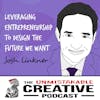Listener Favorites: Josh Linkner | Leveraging Entrepreneurship to Design the Future We Want

Josh Linkner joins us to talk about his unique perspective of entrepreneurship and how it will enable us to become the architects of our future. Find out why playing it safe while you're young is the riskiest thing you can do, what entrepreneurshi...
Josh Linkner joins us to talk about his unique perspective of entrepreneurship and how it will enable us to become the architects of our future. Find out why playing it safe while you're young is the riskiest thing you can do, what entrepreneurship really looks like, what enables the coexistence of ambition and fulfillment, how to make the most of a pandemic as well as what is going to prevent many of us from doing that.
Visit Josh Linkner's website to find his book, his blog and his inevitable podcast | https://JoshLinkner.com
Subscribe for ad-free interviews and bonus episodes https://plus.acast.com/s/the-unmistakable-creative-podcast.
Hosted on Acast. See acast.com/privacy for more information.
Candid Conversations: Elevate Your Thinking with Masters of Their Craft
Dive into a realm of transformative conversations, where wisdom from trailblazers who've shattered norms is at your fingertips. Learn from best-selling authors who've decoded productivity, and thought leaders who've sculpted the landscape of personal and professional growth. Unearth the secrets of successful entrepreneurs, delve into the science of habits, and explore the art of charisma. Each conversation is a journey, brimming with unexpected insights and practical wisdom that will ignite you











